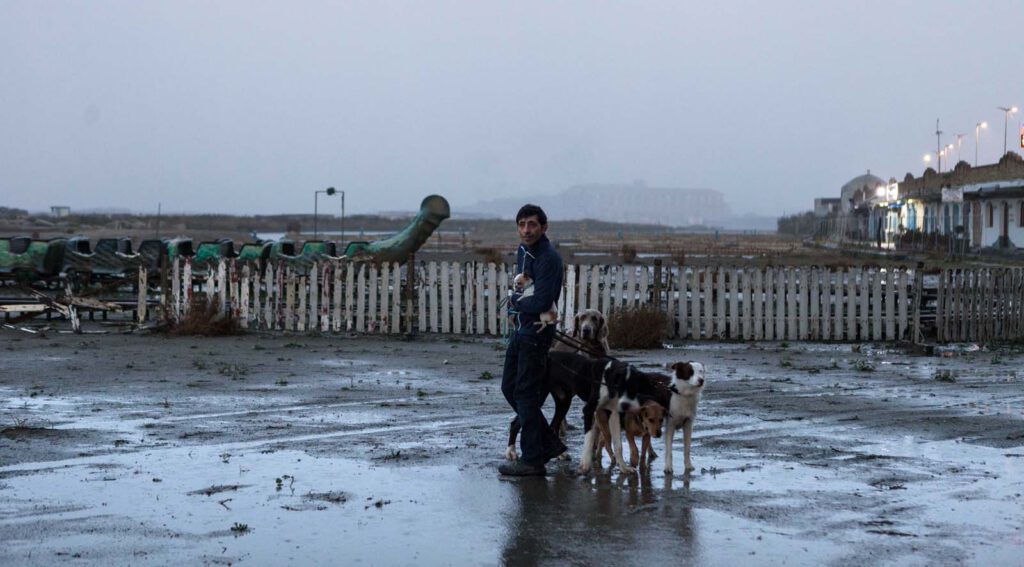The morning dawned in Cannes with cloudy skies over the port, and an early chill in the air that could promise more rain in this mostly sunless week at the film festival. It was a fitting setup for Italian director Matteo Garrone’s new film “Dogman,” premiering in competition. Garrone scored an international hit in 2008, with his contemporary gangster saga “Gomorrah,” which won the Grand Jury Prize at Cannes. Following satires “Reality” and “Tale of Tales,” he returns to the gangster genre with this dark tragic portrait of a little man who hitches his star to a violent force he can’t control.
Marcello (Marcello Fonte), a dog groomer by trade, is a diminutive man with a grave-pinched face that wouldn’t be out of place in Modigliani painting. His town is a bleak seafront outpost with a line of shabby shops facing an empty plaza baking in harsh sun. On the side, he supplies cocaine to the hulking, unstable punk Simoncino (Edoardo Pesce), a mob unto himself who is despised throughout the neighborhood, and to whom Marcello shows fealty in a strange, self-destructive bondage.
Marcello’s loving affinity for dogs of every kind is deep, boundless, and beautifully affecting. In fact, it’s the only unadulterated thing in “Dogman.” This is affectingly portrayed when, after moonlighting as the getaway driver for a late-night home invasion, he returns alone to the ransacked scene of the crime to rescue a Chihuahua that Simoncino has boasted of brutalizing and leaving to die.
Symbolic of the unequal relationship between the two men, Garrone sets up a visually surreal contrast between the undersized groomer and the dogs he serves in his line of work, with many views of Marcello dwarfed by a Great Dane or mastiff posed majestically like a Sphinx on the grooming table. His ability to gentle these massive creatures that sometimes snarl and lunge does not carry over to humankind.
Garrone doesn’t explain what links Marcello to a mad-dog of a man like Simoncino with such puppy-like devotion, whether strictly for money, out of fear, or out of something else entirely, but he allows the terrible trajectory of their relationship to play out with a mythic inevitability. Time and again the thug betrays Marcello’s misplaced trust, finally bringing him down with a robbery that destroys his reputation and his livelihood, and makes him a pariah among the little circle of smalltime business owners that he counted as his friends and associates. Garrone sets the stage for an intense and powerful day of reckoning, when master and dog will trade places.

The criminal hero of “Capernaum,” also premiering in competition today, is a twelve-year-old child, but so slight and undersized that he looks no more than eight. He is first seen being led to court in handcuffs. “Capernaum,” by Lebanese director/actress Nadine Labaki (“Caramel”), is the final of the three films by female directors to debut in this year’s competition.
Speculation and polls concerning the Palme—for what they are worth, since no one truly knows—have Hirokazu Kore-eda’s child-centered family drama “Shoplifters” as the likely favorite of Cate Blanchett’s jury so far. If they like “Shoplifters,” they may love “Capernaum,” a statement I make in all cynicism, for it’s a cathartic but manipulative film, the kind that ends up as humanistic Oscar bait.
Zain (Zain Alrafeea), is the son of a slum-dwelling Beirut family with so many children that it’s never made clear just of many brothers and sisters he has. He’s a tough-talking little boy who smokes, swears, and swaggers like an adult, forced by his parents to work for a convenience store owner, with some drug running on the side. The boy cherishes his pretty eleven-year-old sister Sahar (Cedra Izam), but she is as good as cash to the family after she has her first period, and Zain runs away once her fate is sealed. Legally he doesn’t exist, for his birth was never registered, and he’s never been to school.
Director Labaki has cast the film well, with first-time actors whose real-life situations mirror those of her characters. Alrafeea is a natural, with a clever expressive face and the charisma of a movie star, a rare find who easily carries the film. The bulk of his story is depicted in flashback from the day he appears in court to sue his parents for giving him life.
Zain forms a makeshift family with Rahil (Yordanos Shifera), an undocumented Ethiopian immigrant who takes him to her squatter’s shack out of pity, where he becomes babysitter and surrogate big brother to her toddler Yonas. When Rahil fails to come home one day, the film becomes the survival odyssey of the two children, with Zain’s unflagging adult smarts and ingenuity keeping them alive against all odds, until it all comes to a climax before a judge.
Despite the realist settings, “Capernaum” is not a social realist film. It’s a heart-rending melodramatic cocktail with touches of light humor, beautiful but wronged children, and characters who function as certified villains despite the fact that circumstances render them victims themselves. Soaring soundtrack music makes it go down easy. Not to denigrate the seriousness of Labaki’s pure intentions, but it’s the kind of film calculated to make audiences feel good about human rights as long as the need wears an appealing face.












